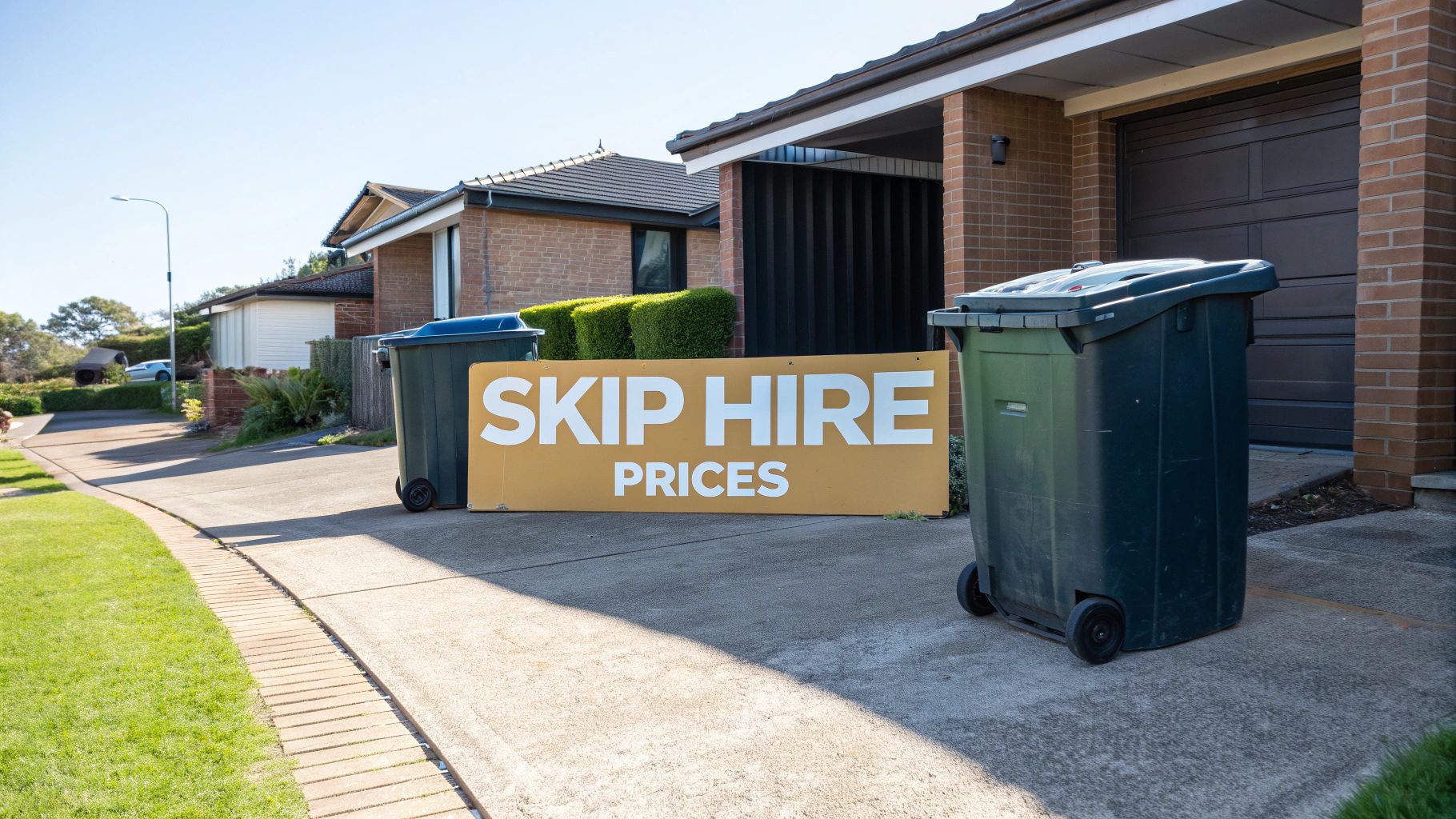Finding Waste Disposal Near Me in the UK
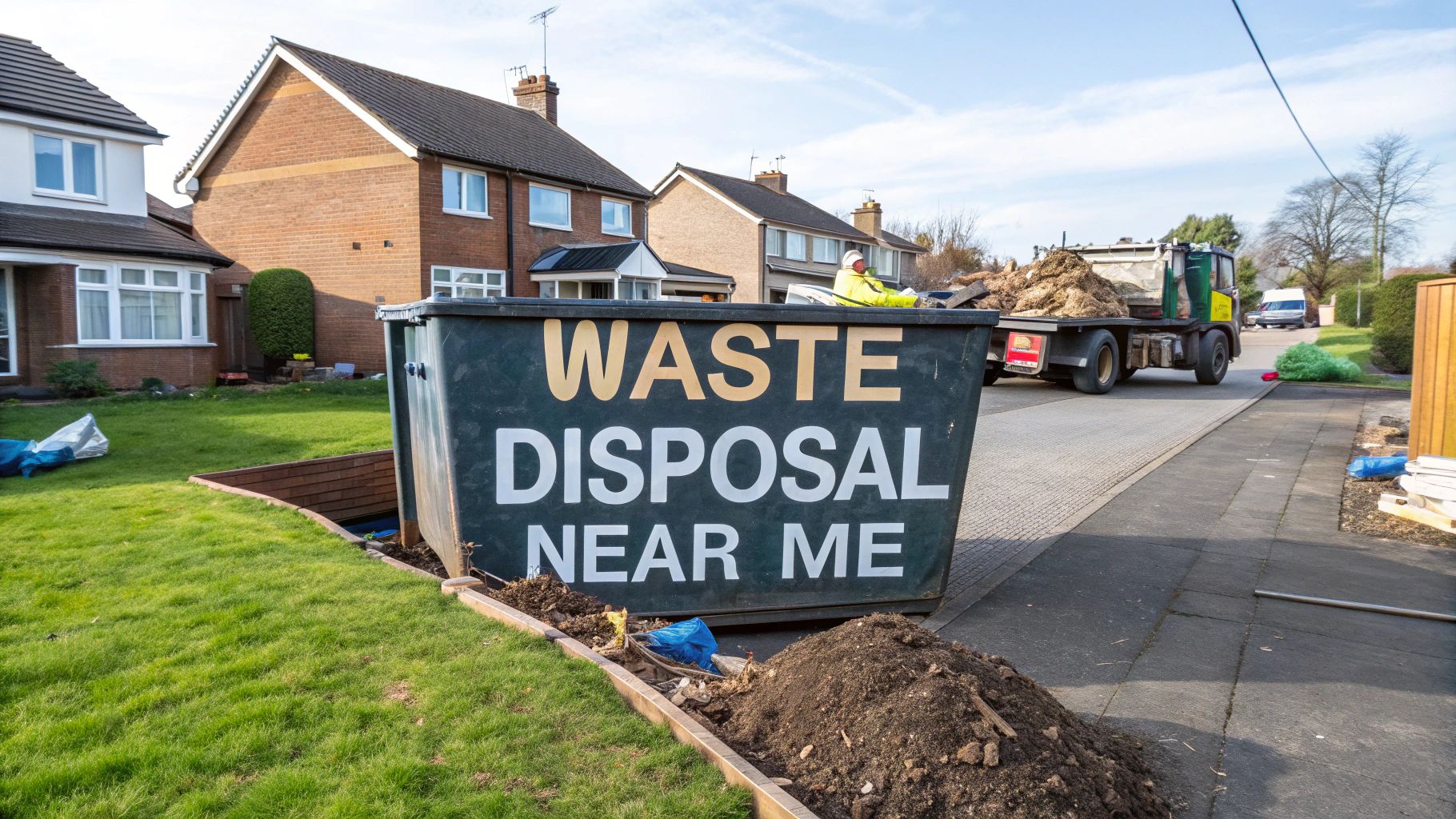
Finding Waste Disposal Near Me in the UK
When your project—whether it’s a home renovation, a garden overhaul, or a major declutter—creates more rubbish than your wheelie bin can handle, you’ll need to call in the professionals. A quick search for “waste disposal near me” will throw up a few usual suspects: skips, man-and-van collections, and grab lorries. Each is a tool for a different job, and this guide will help you confidently pick the most practical and cost-effective fit.
Quick Guide to Local Waste Disposal Options
To get started, it helps to see the main options side-by-side. Think of this as your cheat sheet for matching the service to your job. Each one has its strengths, and knowing them upfront can save you a lot of hassle and money.
| Service Type | Best For | Typical Load Size | Key Consideration |
|---|---|---|---|
| Skip Hire | Mixed waste from renovations, garden clearances, or large decluttering projects. Ideal for jobs lasting several days. | 2-12 cubic yards (for standard skips) | You need space for it (driveway or a council permit for the road). You do all the loading yourself. |
| Man & Van | A few bulky items (sofa, mattress, fridge) or clearing out a flat. Perfect for quick, one-off collections. | A few large items up to a full van load. | Labour is included, so it’s great if you can’t do the heavy lifting. Often a same-day service. |
| Grab Lorry | Huge volumes of heavy, inert waste like soil, concrete, rubble, or hardcore from construction or landscaping. | 12-18 tonnes | The lorry’s crane does all the loading, but it needs clear access to the pile of waste. |
This table gives you a bird’s-eye view, but the best choice always comes down to the specifics of what you’re throwing away and how you need it gone.
Getting a Feel for the Scale of Your Waste
It’s easy to underestimate just how much stuff you’re getting rid of. The UK as a whole generates a staggering 222 million tonnes of waste annually, and the industry managing it all was recently valued at USD 40.2 billion. Those numbers aren’t just trivia; they show why getting waste disposal right is so important. For a deeper dive, you can check out this comprehensive waste management guide.
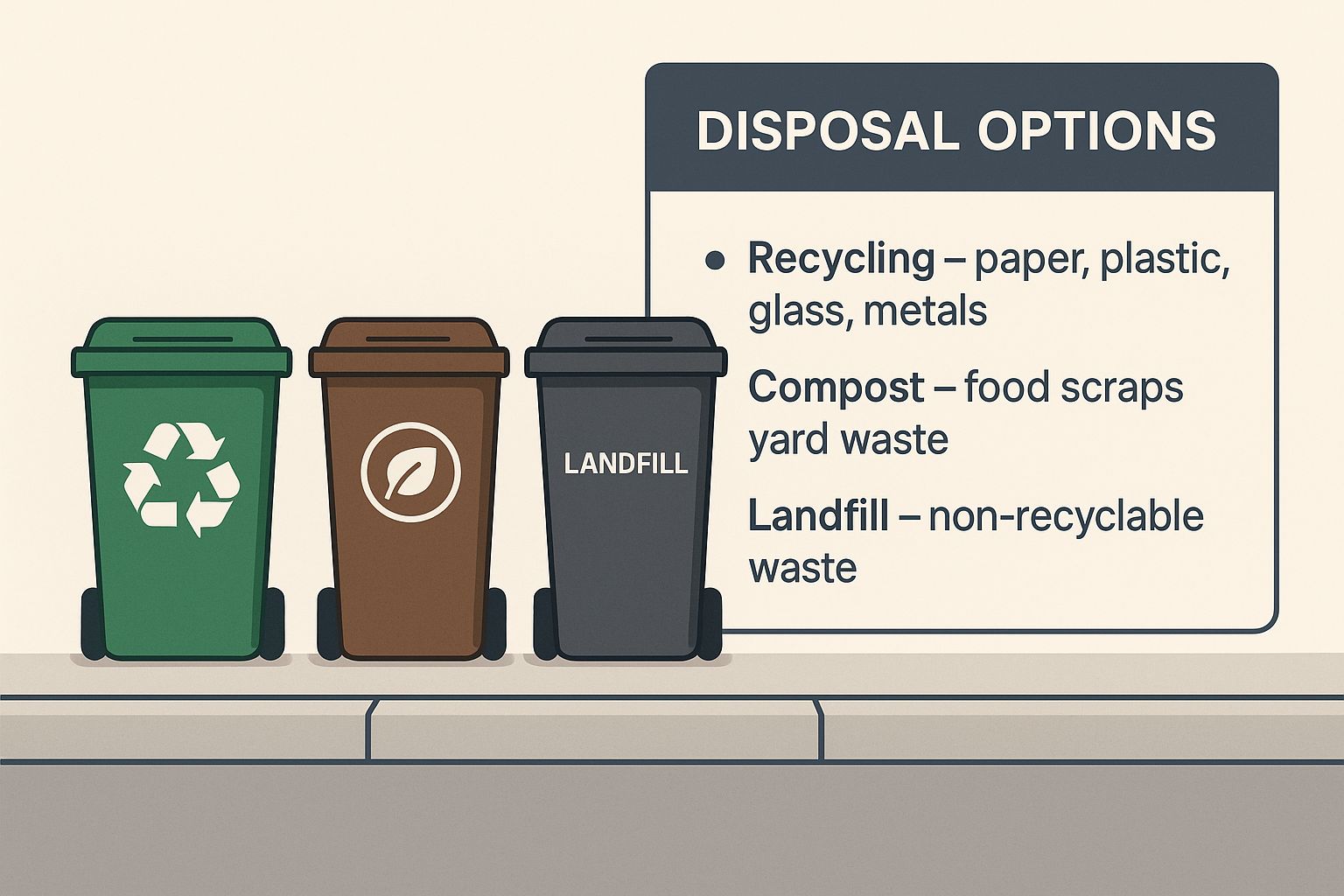
When you hire a proper service, you’re plugging into a massive, regulated system designed to handle waste responsibly. It’s not just about dumping it—it’s about sorting, recycling, and processing everything correctly.
Matching the Service to Real-Life Scenarios
Let’s move away from theory and look at some common situations. Thinking through these real-world examples is the best way to figure out what you actually need.
- A full kitchen strip-out: You’ll have a mix of bulky items like old cupboards and worktops, plus heavy stuff like tiles and plasterboard. In this case, a medium-sized skip parked on your drive for a week is usually the perfect solution. It gives you time to fill it as you work.
- Clearing out a rented flat: Got a few large items to go? A mattress, an old sofa, and a dozen bags of clutter? This is a textbook job for a man-and-van service. They bring the muscle, load it all up, and are usually gone within a couple of hours. Simple.
- Major garden landscaping: If you’re digging out tonnes of soil, turf, and old patio slabs, the sheer weight and volume scream for a grab lorry. It can scoop up huge amounts of heavy, inert materials in minutes, saving you from a back-breaking amount of shovelling.
What Can and Cannot Be Thrown Away
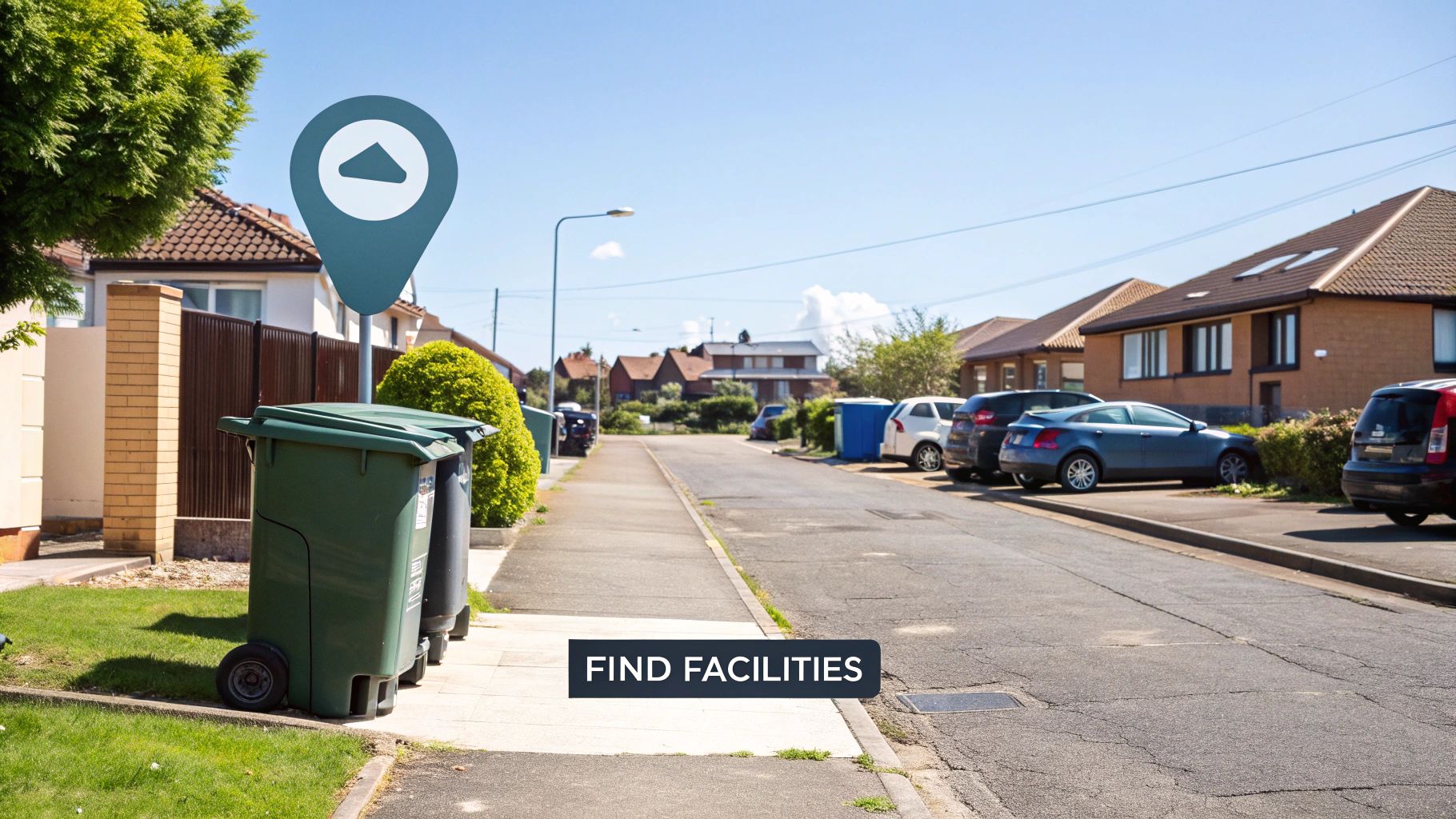
Before you finalise that booking, it’s absolutely vital to know what you’re throwing out. This isn’t just about being tidy; it’s about safety, following the rules, and most importantly, avoiding unexpected fines from your waste company.
Think of it like packing for a holiday—some things are fine to toss in, while others are strictly forbidden.
Most general waste skips and collection services are geared up for your typical household or construction clear-out. Say you’re finally tackling that cluttered shed or giving the garden a much-needed makeover. The kinds of items that are perfectly fine include:
- General Household Junk: Old furniture, kids’ toys, carpets, and clothes.
- Garden Waste: Soil, grass clippings, branches, and even old patio slabs are usually good to go.
- Construction Debris: Wood, bricks, metal, rubble, and concrete are standard fare for most skips.
A bit of prep work here can make a massive difference. For instance, taking a few minutes to break down flat-pack furniture saves a surprising amount of space, meaning you might even get away with a smaller, cheaper skip.
The Items That Need Special Attention
The real head-scratcher comes with materials that are classed as hazardous or need specialist disposal. Tossing these into a general waste skip is not only illegal but will likely get your load rejected or land you with a hefty surcharge. These rules are here to protect both the environment and the people handling your waste.
A common mistake we see is people assuming that just because it came from their house, it can go in a general skip. Things like old paint tins, car batteries, and fluorescent tubes contain chemicals that can do real harm if they end up in a landfill.
Here are some of the most common culprits you need to keep separate:
- Plasterboard: Because of its gypsum content, it has to be disposed of separately from other waste to stop it from releasing harmful gases.
- Asbestos: This is a highly dangerous material and absolutely requires a specialist removal and disposal service. No exceptions.
- Electricals (WEEE): Anything with a plug or battery—from an old kettle to a TV—falls under Waste Electrical and Electronic Equipment regulations.
- Chemicals & Liquids: This includes paint, solvents, oils, and gas bottles.
- Tyres and Batteries: These contain harmful materials and must be recycled at specialist facilities.
So, what if you have a mix of waste types? A full kitchen strip-out is a classic example: you’ve got cupboards (general waste) but also old appliances (WEEE). You’ll need a clear plan. This might mean arranging a separate collection for the electrical items or taking them to the local tip yourself.
For a really detailed breakdown, it’s always worth checking a comprehensive guide on what can go in a skip to make sure you’re fully compliant. A little bit of planning here really does save a world of trouble later on.
How to Find and Vet Local Waste Disposal Companies
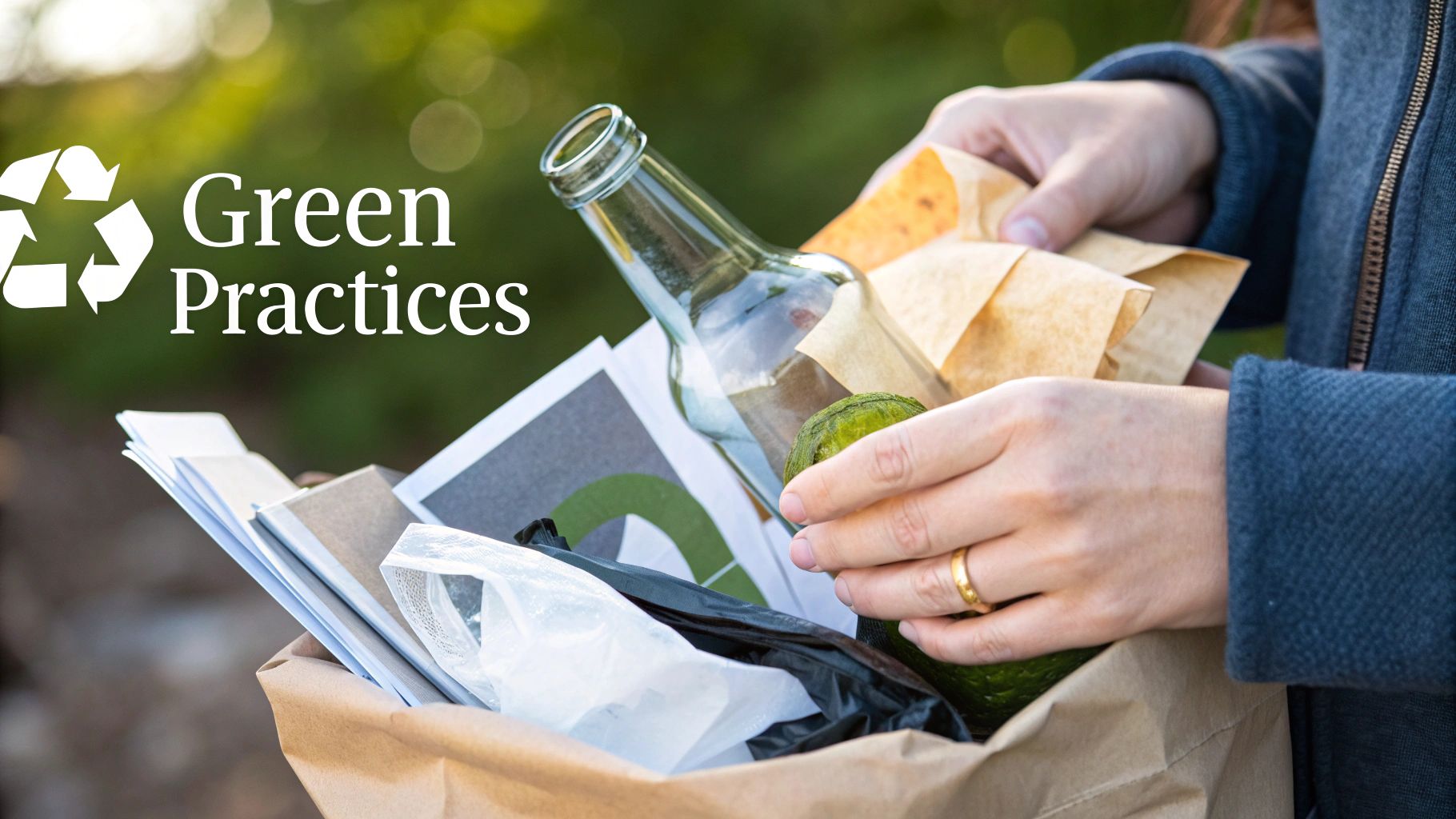
A quick search for “waste disposal near me” will throw a huge list of companies your way, all promising the best service at the lowest price. So, how do you sort the genuine pros from the rogue traders? It comes down to looking past the flashy website and knowing exactly what to check for.
The very first thing you need to verify is their Waste Carrier Licence. This isn’t just a nice-to-have; it’s a legal requirement for any legitimate company transporting waste in the UK. They must be registered with the Environment Agency, and you can easily check their licence number on the public register. If a company can’t provide one or it doesn’t match up, walk away. Simple as that.
This isn’t just about red tape. If you hire an unlicensed carrier, you have zero guarantee of where your waste ends up. If it gets fly-tipped, you could be the one hit with a hefty fine, even though you paid someone to take it away.
Reading Between the Lines of Customer Reviews
Once you’ve confirmed a company is licensed, it’s time to see what real customers think. Don’t just glance at the star rating on Google or Trustpilot. You need to dive into the actual comments.
Look for patterns. Are people consistently praising their punctuality and clear communication? That’s a brilliant sign. On the flip side, if you spot repeated grumbles about surprise costs, damaged driveways, or skips that never showed up, treat those as serious red flags.
A couple of bad reviews aren’t always a deal-breaker—things can go wrong. The key is how the company responds. A professional reply that offers a solution shows they actually care about their reputation and their customers.
Essential Questions to Ask Before You Book
Before you commit to anything, it’s always a smart move to have a quick chat with the companies on your shortlist. The way they answer a few key questions will tell you everything you need to know about their professionalism and whether they’re being upfront with you. This is your chance to dodge any nasty surprises later.
Your legal responsibility for your waste doesn’t end when the lorry drives away. You must get a Waste Transfer Note from the company. This is your proof that the waste was passed to a licensed carrier. Keep it safe.
Make sure you get crystal-clear answers to these questions:
- Insurance: “Are you fully insured with public liability insurance?” This is vital as it protects you and your property from any accidental damage during the collection.
- Pricing: “Is your quote all-inclusive, or could there be extra charges for things like weight limits, council permits, or specific materials?”
- Disposal Process: “Where will my waste actually be taken?” A good, reputable company will be happy to tell you about the licensed Waste Transfer Station they use for proper sorting and recycling.
Asking these simple questions helps you hire with confidence. The principles of vetting local providers are often quite similar across different trades. For instance, while it focuses on storage, this guide on the general strategies for finding local services offers some great broader insights into comparing your options.
With England alone generating around 21.7 million tonnes of household waste last year, choosing a responsible provider is more important than ever. The UK’s household recycling rate is currently at 44.6%, and by hiring professionals who use the correct disposal channels, you’re doing your bit to help. You can explore the latest UK statistics to learn more about these figures and responsible waste practices.
Right, you’ve got your list of reputable, licensed waste carriers. Now for the crucial part: picking the right tool for the job.
Deciding between a skip, a man-and-van collection, or a hefty grab lorry isn’t just about the price tag. It’s about figuring out the most practical, efficient, and headache-free way to clear your specific waste. Get this wrong, and you could be looking at wasted time, money, and a whole lot of frustration.
Let’s ditch the generic descriptions and get into some real-world situations. This should help you picture exactly which service is the right fit for your project.
When to Hire a Skip
A skip is your best mate for those jobs that create a steady flow of mixed rubbish over a few days. Just think of it as your own personal, on-site bin that you can fill up as you go.
A classic example? A week-long bathroom renovation. You’ll be ripping out old tiles, the tub, the toilet, and maybe even chunks of the wall. Having a skip parked on your drive means you can chuck all this debris out as you create it, keeping your work area safe and tidy. It’s the perfect setup for controlled, multi-day projects where you’re happy to do the loading yourself.
A skip is your go-to for:
- DIY renovations: Stripping out a kitchen or bathroom, or a small extension project.
- Major garden clear-outs: Tearing up old decking, fencing, and a mix of green waste over a weekend.
- Big house declutters: Clearing a loft, garage, or an entire property where you need time to sort as you go.
When to Use a Man and Van Service
A man-and-van collection is all about speed and convenience – plus an extra pair of hands. This service is a lifesaver for quick, one-off clearances where the waste is already piled up and you just want it gone now. It’s also brilliant for bulky items you can’t lift on your own.
Picture this: you’ve just had a new sofa delivered. The old, saggy one needs to go, along with a spare mattress from the guest room. This is a textbook job for a man-and-van team. They can often show up the same day, handle all the heavy lifting, load everything up, and be gone in under an hour. You’re paying for both the disposal and the labour.
The real value of a man-and-van service is its immediacy and the included muscle. For shifting a few bulky items or clearing out a small flat, it’s often cheaper and faster than hiring a small skip you might only half-fill.
When a Grab Lorry Is the Only Answer
For massive amounts of heavy, inert waste, the grab lorry is the undisputed champion. This is the heavy-duty solution for jobs where a skip is just too small or would be impossible to load by hand. The magic is in the hydraulic crane that literally “grabs” the waste from a pile.
Think about a major landscaping project where you’re digging out tonnes of soil and clay for a new patio foundation. Or maybe you’re breaking up an old concrete driveway. Shovelling that amount of heavy material into a skip would be back-breaking and take forever. A grab lorry can pull up, scoop 18 tonnes of material in less than 30 minutes, and drive off. It needs clear access, of course, but for sheer volume and weight, nothing else comes close.
Making the right choice from the get-go saves you from overspending. It’s always tempting to jump at the lowest quote, but as you can discover in our guide, understanding why the lowest price is not always best for skip hire is the key to a smooth and successful project.
Navigating Costs and Avoiding Hidden Fees
Let’s be honest, nobody likes a surprise bill. When you’re searching for “waste disposal near me,” getting a clear, straightforward price is every bit as important as the service itself. The best way to protect yourself from unexpected charges is to understand exactly how companies put their prices together.
The final figure you see on an invoice is almost never just one simple cost. It’s a blend of different factors. Your postcode plays a big role, for instance, as transport costs naturally vary from area to area. The type of waste you’re getting rid of is another crucial piece of the puzzle; some materials simply cost more to process than others.
A major one that often gets overlooked is food waste. This is a huge issue in the UK, carrying significant economic weight. We waste around 9.52 million tonnes of food every single year. For households, that adds up to a staggering loss of £14 billion annually, which breaks down to an average of £470 worth of good food being thrown away per home. You can dig deeper into these numbers in this report on UK food waste statistics.
Decoding the Quote
When a quote lands in your inbox, don’t just glance at the big number at the top. You need to know precisely what it includes. A reputable company will be transparent about what might cost extra, but it never hurts to ask directly.
Here are the usual suspects that can change the final price:
- Service Type: The way a skip hire is priced is completely different from a man-and-van collection or a grab lorry.
- Permit Fees: If your skip has to live on a public road, your provider will sort out the council permit for you, but that cost will be passed on and added to your bill.
- Waste Type: Getting rid of mixed general waste is usually standard. However, you’ll almost certainly pay more for specific items like mattresses, tyres, or plasterboard.
For a really detailed look at how all these elements work together, check out our article that breaks down how much it is to hire a skip.
The most common reason for a surprise charge? Simple miscommunication. Being upfront about what you’re throwing out and where you need the service allows the company to give you a truly accurate quote right from the start.
Common Pitfalls and How to Avoid Them
Often, “hidden fees” aren’t really hidden at all. They’re usually penalties for not sticking to the rules. Knowing about these common tripwires is the key to keeping your project on budget.
Keep an eye out for these potential extra charges:
- Overfilled Skips: Every skip has a “level load” line. Filling it beyond that point is not just against the rules—it’s dangerous and illegal to transport on the road. The driver will either have to refuse the collection or charge you extra to remove the excess waste so it’s safe.
- Incorrect Waste: As we mentioned, sneaking prohibited items like old fridges or paint tins into a general waste skip will lead to extra disposal fees. Always, always check first if you’re unsure.
- Failed Collections: If the lorry driver turns up and can’t get to your skip or waste pile because of a blocked drive, locked gate, or parked car, you may well be charged a “wasted journey” fee to cover their time and fuel.
By getting a handle on these potential issues beforehand, you can make sure the whole process runs smoothly, without any unwelcome financial shocks. It really just comes down to clear communication and a bit of forward planning.
Your Waste Disposal Questions Answered
To wrap things up, let’s run through some of the most common questions we get asked, especially by people arranging waste disposal for the first time. Getting a few final bits of clarity can make all the difference, helping you move forward with your project confidently.
Do I Need a Permit for a Skip?
Yes, but there’s a simple rule: you only need a permit if you plan to place the skip on public land. This means the road outside your house, a grass verge, or any other council-owned property.
If the skip will sit entirely on your own private land, like your driveway or in the garden, then no permit is required.
Most reputable skip hire companies, including us, will handle the permit application with your local council for you. Just be aware that the permit cost, which varies from council to council, will be added to your final bill. It’s always a good idea to give your provider a few days’ notice to get all the paperwork sorted.
How Can I Save Money on Waste Disposal?
This is a great question. Saving money often comes down to smart planning rather than just grabbing the cheapest quote you can find. The single best way to cut costs is to get a really good handle on your waste volume before you book. It ensures you don’t overpay for a large skip that you only end up half-filling.
Here are a few practical tips to keep your budget in check:
- Break It Down: Take the time to flatten cardboard boxes and break down bulky items like old wardrobes. You’d be amazed at how much space this saves.
- Share the Cost: Got a big project on the go? It might be worth asking your neighbours if they have any rubbish they need to clear out. Sharing the cost of a single, larger skip can work out much cheaper for everyone involved.
- Segregate and Salvage: Before you throw anything out, have a quick think about its value. Could that old furniture be sold on Facebook Marketplace or donated to a local charity? Can you take certain materials, like clean soil or rubble, to the local tip for free?
What Happens to My Waste After Collection?
When you use a professional service for waste disposal, your rubbish doesn’t just vanish into thin air. A licensed operator will take it to a regulated Waste Transfer Station. This is where the real work of responsible disposal kicks off.
Once it arrives, the entire load is weighed and then tipped out onto a large sorting floor. From there, a combination of heavy machinery and manual pickers gets to work, separating all the different materials. Wood, metals, plastics, soil, and cardboard are all segregated for recycling.
The main goal here is diversion from landfill. A good, modern facility will aim to recycle as much as 98% of the waste it processes. Only the tiny fraction of genuinely non-recyclable material is sent to a landfill or an energy-from-waste plant.
What Is a Waste Transfer Note and Why Do I Need One?
This is probably the most important piece of paper in the whole process. A Waste Transfer Note is your legal proof of disposal. It’s a document that details exactly what waste was collected, who collected it, and where it came from.
The licensed waste carrier is legally required to give you one, and you must keep it safe for at least two years. It’s the document that officially transfers the responsibility for the waste from you to them.
More importantly, it’s your absolute defence if your rubbish is ever found fly-tipped. It proves you did the right thing, hired a legitimate company, and acted responsibly.
Ready to tackle your project with a waste management partner you can trust? At The Waste Group, we provide reliable, straightforward, and compliant solutions for everything from garden clear-outs to large construction jobs. Get your instant quote and book your service online today by visiting https://www.thewastegroup.co.uk.
Article created using Outrank

